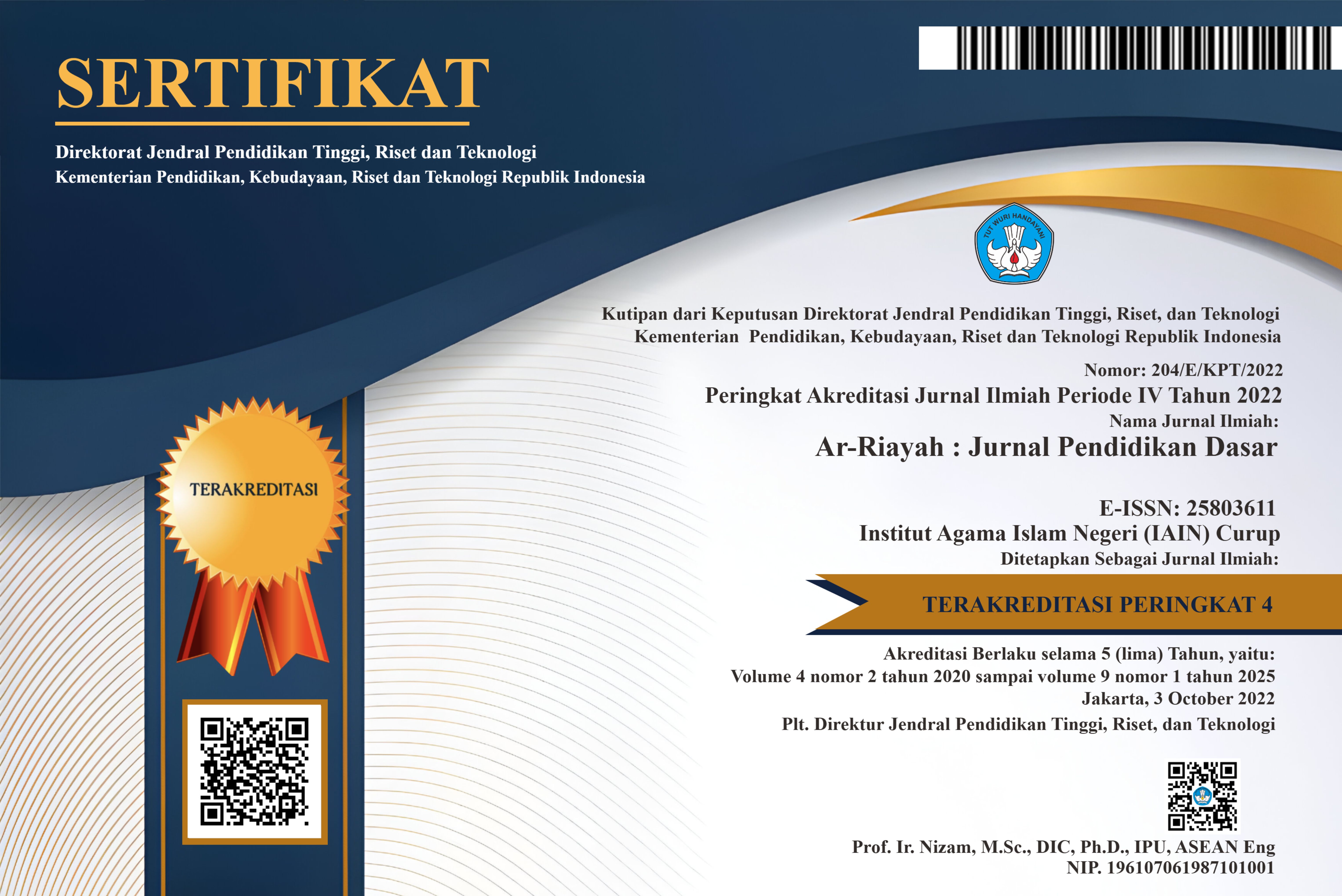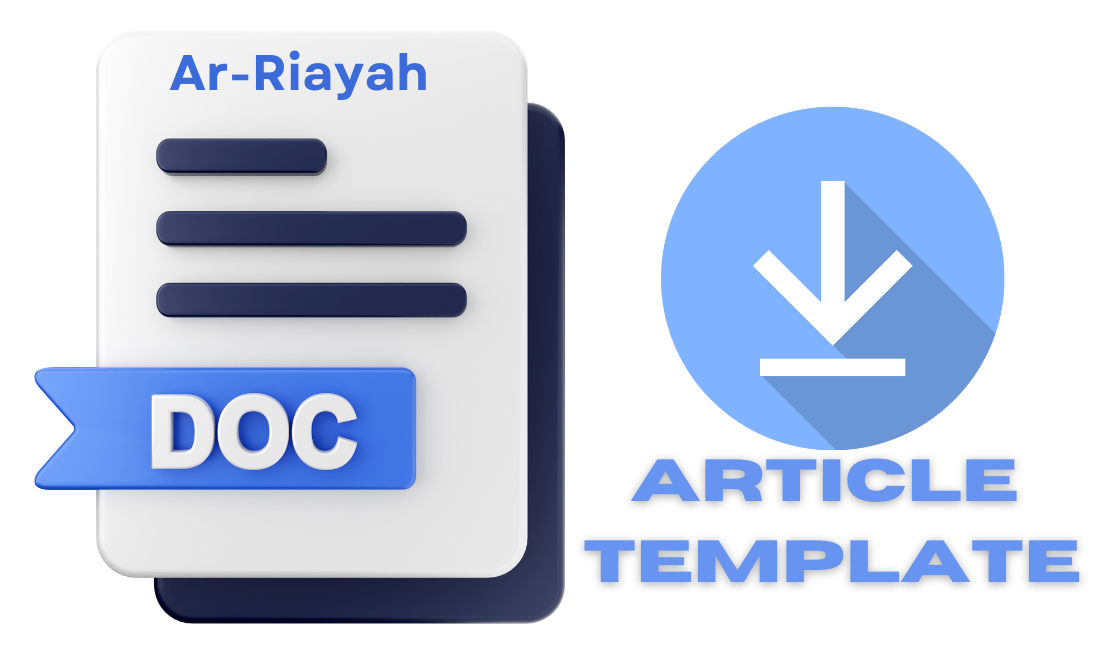Efektivitas Model Pembelajaran Berdiferensiasi untuk Meningkatkan Kemampuan Literasi Sains pada Siswa Sekolah Dasar Kelas V
DOI:
https://doi.org/10.29240/jpd.v8i1.9067Keywords:
Differentiated learning, Nature of Science, science literacyAbstract
Downloads
References
Beck, Dennis, and Jennifer Beasley. “Identifying the Differentiation Practices of Virtual School Teachers.†Education and Information Technologies 26, no. 2 (March 8, 2021): 2191–2205. https://doi.org/10.1007/s10639-020-10332-y.
Bybee, Rodger W. “Scientific Literacy, Environmental Issues, and PISA 2006: The 2008 Paul F-Brandwein Lecture.†Journal of Science Education and Technology 17, no. 6 (December 11, 2008): 566–85. https://doi.org/10.1007/s10956-008-9124-4.
Choi, Kyunghee, Hyunju Lee, Namsoo Shin, Sungâ€Won Kim, and Joseph Krajcik. “Reâ€conceptualization of Scientific Literacy in South Korea for the 21st Century.†Journal of Research in Science Teaching 48, no. 6 (August 21, 2011): 670–97. https://doi.org/10.1002/tea.20424.
DeBoer, George E. “Scientific Literacy: Another Look at Its Historical and Contemporary Meanings and Its Relationship to Science Education Reform.†Journal of Research in Science Teaching 37, no. 6 (August 2000): 582–601. https://doi.org/10.1002/1098-2736(200008)37:6<582::AID-TEA5>3.0.CO;2-L.
Dikdas. MODUL BELAJAR MANDIRI CALON GURU Pegawai Pemerintah Dengan Perjanjian Kerja: Pedagogi. Jakarta: Direktorat GTK Pendidikan Dasar Direktorat Jenderal Guru dan Tenaga Kependidikan Kementerian Pendidikan dan Kebudayaan, 2021.
GarcÃa-Carmona, Antonio. “Learning about the Nature of Science through the Critical and Reflective Reading of News on the COVID-19 Pandemic.†Cultural Studies of Science Education 16, no. 4 (December 1, 2021): 1015–28. https://doi.org/10.1007/s11422-021-10092-2.
Gibbs, Kathryn. “Voices in Practice: Challenges to Implementing Differentiated Instruction by Teachers and School Leaders in an Australian Mainstream Secondary School.†The Australian Educational Researcher 50, no. 4 (September 25, 2023): 1217–32. https://doi.org/10.1007/s13384-022-00551-2.
Gregory, G. H, and C Chapman. Differentiated Instructional Strategies: One Size Doesn’t Fit All. Corwin Press, 2002.
HALİL, Turgut. “Scientific Literacy for All.†Ankara Universitesi Egitim Bilimleri Fakultesi Dergisi, 2007, 001–024. https://doi.org/10.1501/Egifak_0000000176.
Hanushek, Eric A., and Ludger Woessmann. “The Economic Impacts of Learning Losses,†2020.
Herwina, Wiwin. “OPTIMALISASI KEBUTUHAN MURID DAN HASIL BELAJAR DENGAN PEMBELAJARAN BERDIFERENSIASI.†Perspektif Ilmu Pendidikan 35, no. 2 (November 4, 2021): 175–82. https://doi.org/10.21009/PIP.352.10.
Howell, Emily L., and Dominique Brossard. “(Mis)Informed about What? What It Means to Be a Science-Literate Citizen in a Digital World.†Proceedings of the National Academy of Sciences 118, no. 15 (April 13, 2021). https://doi.org/10.1073/pnas.1912436117.
Hurd, Paul DeHart. “Scientific Literacy: New Minds for a Changing World.†Science Education 82, no. 3 (June 1998): 407–16. https://doi.org/10.1002/(SICI)1098-237X(199806)82:3<407::AID-SCE6>3.0.CO;2-G.
JilardiDamavandi, Alireza, Rahil Mahyuddin, Habibah Elias, Shafee Mohd Daud, and Jafar Shabani. “Academic Achievement of Students with Different Learning Styles.†International Journal of Psychological Studies 3, no. 2 (November 28, 2011). https://doi.org/10.5539/ijps.v3n2p186.
Karamustafaoǧlu, Orhan. “Evaluation Of Novice Physics Teachers’ Teaching Skills.†In AIP Conference Proceedings, 501–2. AIP, 2007. https://doi.org/10.1063/1.2733256.
Katman, and Yusuf Rohmat. “PANDUAN PENGGUNAAN MODUL Penguatan Literasi Dalam Pembelajaran Di SD Dan SMP,†2022.
Kaynak, Naime Elcan, Valarie L. Akerson, and Emel Cevik. “Third Graders’ Identities as ‘Persons Who Understand Nature of Science’ through an Electricity Unit.†International Journal of Education in Mathematics, Science and Technology 8, no. 1 (January 12, 2020): 44. https://doi.org/10.46328/ijemst.v8i1.771.
Kim, So Lim, and Deoksoon Kim. “English Learners’ Science-Literacy Practice through Explicit Writing Instruction in Invention-Based Learning.†International Journal of Educational Research Open 2 (2021): 100029. https://doi.org/10.1016/j.ijedro.2020.100029.
Laugksch, Rudiger C. “Scientific Literacy: A Conceptual Overview.†Science Education 84, no. 1 (January 2000): 71–94. https://doi.org/10.1002/(SICI)1098-237X(200001)84:1<71::AID-SCE6>3.0.CO;2-C.
Mahdiannur, Muhamad Arif, Erman, Martini, Tutut Nurita, Laily Rosdiana, and Ahmad Qosyim. “PENDAMPINGAN PENGEMBANGAN MODUL AJAR BERDIFERENSIASI UNTUK GURU MATA PELAJARAN IPA SMP/SEDERAJAT BERORIENTASI ESD.†BERNAS: Jurnal Pengabdian Kepada Masyarakat 3, no. 4 (2022): 801–8.
Marlina, Elsa Efrina, and Grahita Kusumastuti. “MODEL PEMBELAJARAN BERDIFERENSIASI UNTUK KETERAMPILAN SOSIAL ANAK BERKEBUTUHAN KHUSUS DI SEKOLAH INKLUSIF.†Padang, 2019.
Matthews, Michael R. Science Teaching: The Role of History and Philosophy of Science. Routledge, 1994. https://doi.org/10.1016/j.ijedro.2020.100029.
Maulana, Ridwan, Annemieke Smale-Jacobse, Michelle Helms-Lorenz, Seyeoung Chun, and Okhwa Lee. “Measuring Differentiated Instruction in The Netherlands and South Korea: Factor Structure Equivalence, Correlates, and Complexity Level.†European Journal of Psychology of Education 35, no. 4 (December 4, 2020): 881–909. https://doi.org/10.1007/s10212-019-00446-4.
Mutasam, Utaria, Ibrohim Ibrohim, and Herawati Susilo. “Penerapan Pembelajaran Sains Berbasis Inquiry Based Learning Terintegrasi Nature of Science Terhadap Literasi Sains.†Jurnal Pendidikan: Teori, Penelitian, Dan Pengembangan 5, no. 10 (October 30, 2021): 1467. https://doi.org/10.17977/jptpp.v5i10.14131.
Namal, Yucel, and Tunay Karakok. “Atatürk and the University Reform (1933).†Journal of Higher Education and Science 1, no. 1 (2011): 27. https://doi.org/10.5961/jhes.2011.003.
Nunes, Terezinha. “Mathematics Learning as the Socialization of the Mind.†Mind, Culture, and Activity 6, no. 1 (January 1999): 33–52. https://doi.org/10.1080/10749039909524712.
OECD. “PISA 2018,†2018.
Palines, Kareen Marie E., and Ruth A. Ortega-Dela Cruz. “Facilitating Factors of Scientific Literacy Skills Development among Junior High School Students.†LUMAT: International Journal on Math, Science and Technology Education 9, no. 1 (August 11, 2021). https://doi.org/10.31129/LUMAT.9.1.1520.
Prachagool, V., and P. Nuangchalerm. “Investigating the Nature Of Science: An Empirical Report on the Teacher Development Program in Thailand.†Jurnal Pendidikan IPA Indonesia 8, no. 1 (March 28, 2019). https://doi.org/10.15294/jpii.v8i1.17275.
Qiu, Xiao-yan, Dan-ping Wang, Hau-yee Lo, and Ming-tak Tsang. “Needs Analysis and Curriculum Development of Vocational Chinese for NCS Students.†SpringerPlus 3, no. S1 (December 4, 2014): O3. https://doi.org/10.1186/2193-1801-3-S1-O3.
Rohmah, Indah Lailatul, and Siti Nurul Hidayati. “ANALISIS LITERASI SAINS PESERTA DIDIK SMPN 1 GRESIK.†PENSA: E-JURNAL PENDIDIKAN 9, no. 3 (2021).
Roth, Wolff-Michael, and Angela Calabrese Barton. Rethinking Scientific Literacy.Routledge,2004.mhttps://doi.org/10.4324/9780203463918.
Ryder, Jim. “Identifying Science Understanding for Functional Scientific Literacy.†Studies in Science Education 36, no. 1 (January 2001): 1–44. https://doi.org/10.1080/03057260108560166.
Şentürk, Cihad, and Hakan Sari. “Investigation of the Contribution of Differentiated Instruction into Science Literacy.†Qualitative Research in Education 7, no. 2 (June 28, 2018): 197. https://doi.org/10.17583/qre.2018.3383.
Tomlinson, Carol Ann. How To Differentiate Instrustion in Academically Diverse Classooms 3rd Edition. Alexandria. 3rd ed. New York: Association for Supervision and Curriculum Development, 2017.
Triyana, D. “Dampak Kualitas Penjelasan Peserta Didik Ahli Terhadap Prestasi Akademik Peserta Didik Pemula Dalam Pembelajaran Fisika SMA Menggunakan Model Kooperatif Tipe Jigsaw.†Universitas Pendidikan Indonesia, 2016.
TURGUT, Halil, and Merve Lütfiye ŞENTÜRK. “Investigation of Preservice Science Teachers’ Scientific Literacy Skills in Terms of Academic Achievement, University Entrance Exam Scores and Grade Level.†Participatory Educational Research 10, no. 6 (November 1, 2023): 124–39. https://doi.org/10.17275/per.23.92.10.6.
Valladares, Liliana. “Scientific Literacy and Social Transformation.†Science & Education 30, no. 3 (June 10, 2021): 557–87. https://doi.org/10.1007/s11191-021-00205-2.
Widowati, A., E. Widodo, P. Anjarsari, and Setuju. “The Development of Scientific Literacy through Nature of Science (NoS) within Inquiry Based Learning Approach.†Journal of Physics: Conference Series 909 (November 2017): 012067. https://doi.org/10.1088/1742-6596/909/1/012067.
Wijaya, Atika, Moh. Solehatul Mustofa, and Fadly Husain. “Sosialisasi Program Merdeka Belajar Dan Guru Penggerak Bagi Guru SMPN 2 Kabupaten Maros.†Jurnal Puruhita 2, no. 1 (December 10, 2020): 46–50. https://doi.org/10.15294/puruhita.v2i1.42325.
Zamjani, Irsyad, Anindito Aditomo, Indah Pratiwi, Lukman Solihin, Ika Hijriani, Bakti Utama, Yogi Anggraena, et al. “NASKAH AKADEMIK PROGRAM SEKOLAH PENGGERAK,†2020.
Downloads
Additional Files
Published
How to Cite
Issue
Section
Citation Check
License
Copyright (c) 2024 Suharto Suharto, Endra Priawasana, Mohamad Halil, Mohammad Ansori, Abdul Wahid

This work is licensed under a Creative Commons Attribution-NonCommercial-ShareAlike 4.0 International License.
Authors who publish with Ar-Riayah: Jurnal Pendidikan Dasar agree to the following terms:
Authors retain copyright and grant the journal right of first publication with the work simultaneously licensed under a Creative Commons Attribution-NonCommercial-ShareAlike 4.0 International License (CC BY-NC-SA 4.0) that allows others to share the work with an acknowledgment of the work's authorship and initial publication in this journal.
Authors are able to enter into separate, additional contractual arrangements for the non-exclusive distribution of the journal's published version of the work (e.g., post it to an institutional repository or publish it in a book), with an acknowledgment of its initial publication in this journal.
- Authors are permitted and encouraged to post their work online (e.g., in institutional repositories or on their website) prior to and during the submission process, as it can lead to productive exchanges, as well as earlier and greater citation of published work (See The Effect of Open Access).










